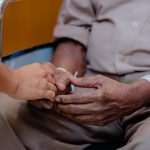Discover What to Expect from Our Home Nursing Services. Learn More

-
CALL: +011 5 777 777

- Home Nursing Care
- December 31, 2024
- 8 MINS READ
When it comes to long-term recovery, choosing the right care setting is a critical decision. Whether recovering from surgery, managing chronic illnesses, or rehabilitating after an injury, patients and their families often face a dilemma: home nursing or hospital care? Each option has its advantages and drawbacks, and the choice largely depends on the patient’s specific needs, medical condition, and personal preferences. In this blog, we’ll explore the differences between home nursing and hospital care to help you make an informed decision for long-term recovery.
The Benefits of Home Nursing Care
Home nursing care involves receiving professional medical and non-medical services in the comfort of one’s home. This option has gained popularity for long-term recovery due to its many benefits:
- Personalized Care – Home nursing offers highly individualized care plans tailored to the unique needs of each patient. Professional caregivers and nurses provide focused attention, ensuring that every aspect of the patient’s recovery process is addressed. From medication management to physiotherapy, the care is designed to adapt as the patient’s condition evolves. This flexibility is especially valuable for those whose needs may change over time.
- Comfort and Familiarity – One of the most significant advantages of home nursing is the comfort of being in a familiar environment. For many patients, the psychological and emotional benefits of staying at home contribute to a quicker and more holistic recovery. Surrounded by family and personal belongings, patients often feel less anxious and more motivated to follow their recovery plan. The home setting fosters a sense of normalcy, which can be instrumental in improving overall well-being.
- Reduced Risk of Infections – Hospitals, despite stringent hygiene protocols, are environments where patients are exposed to hospital-acquired infections. Home nursing significantly reduces this risk, providing a safer option for individuals with weakened immune systems or chronic conditions. The controlled and less crowded home environment minimizes exposure to harmful pathogens.
- Cost-Effectiveness – For long-term recovery, hospital stays can be prohibitively expensive. Home nursing often proves to be a more affordable alternative while maintaining high standards of medical care. Patients pay only for the specific services they need, eliminating unnecessary expenses. Families can allocate resources more effectively, focusing on what truly matters for the patient’s recovery.
- Family Involvement – Home nursing allows family members to be actively involved in the recovery process. This support system can be invaluable for the patient’s emotional well-being and provides family members with peace of mind knowing their loved one is receiving professional care at home. The presence of family can also strengthen the patient’s motivation to adhere to treatment plans and participate in rehabilitation activities.
We are driven to redefine possibilities for our patients. Their well-being is our highest priority, and we go above and beyond to ensure it—no matter the challenge.
The Advantages of Hospital Care
Hospitals remain the first choice for many due to their specialized facilities and resources. For some patients, hospital care is essential to ensure proper treatment and monitoring during recovery.
Access to Advanced Medical Equipment
Hospitals are equipped with state-of-the-art medical technology and diagnostic tools. Patients who require constant monitoring or advanced procedures benefit from the immediate availability of these resources. This access is particularly crucial for those undergoing complex surgeries or treatments that demand continuous supervision.
Specialized Staff
In a hospital, patients have access to a wide range of medical professionals, including specialists, surgeons, and therapists. This multidisciplinary approach ensures comprehensive care for complex medical cases. The collaboration among different specialists ensures that all aspects of a patient’s condition are addressed.
Immediate Emergency Response
For patients at risk of medical emergencies, the hospital setting offers unparalleled safety. Emergency interventions are readily available, which can be life-saving in critical situations. The presence of fully equipped emergency rooms and on-call specialists ensures prompt and effective responses to unforeseen complications.
Comparing Home Nursing and Hospital Care
When deciding between home nursing and hospital care, it’s essential to weigh the pros and cons of each option based on several critical aspects:
Environment
Home nursing provides the comfort and familiarity of a patient’s own home, which can have a positive impact on emotional well-being. The presence of familiar surroundings and loved ones creates a supportive atmosphere that enhances mental health. On the other hand, hospitals offer a structured and clinical environment that may be better suited for intensive care and monitoring. This setting ensures constant access to advanced medical resources.
Cost
For long-term care, home nursing is often more cost-effective. Families can choose specific services based on the patient’s needs, avoiding the high costs associated with extended hospital stays. The ability to customize care plans ensures financial efficiency while maintaining high standards of care.
Risk of Infections
Hospitals, while maintaining high hygiene standards, can expose patients to hospital-acquired infections. Home nursing minimizes this risk, making it a safer option for individuals with compromised immune systems. The controlled home environment reduces the likelihood of infection, ensuring a safer recovery process.
Family Involvement
Home nursing encourages active family participation, allowing loved ones to be closely involved in the recovery process. This involvement strengthens emotional bonds and provides patients with a robust support system. In contrast, hospital care may limit family involvement due to strict visitation policies and clinical protocols.
Specialized Care
Hospitals excel in providing comprehensive care for complex medical conditions, with access to specialists and advanced medical equipment. Home nursing, while personalized, may not always accommodate the same level of specialization but can still effectively manage routine medical needs and rehabilitation. Patients requiring advanced diagnostic or therapeutic interventions may benefit more from hospital care.
Emergency Response
While home nursing services include basic emergency protocols, hospitals are better equipped to handle sudden and critical medical emergencies due to their advanced resources and on-site medical teams. The immediate availability of emergency services provides an added layer of security for high-risk patients.
Factors to Consider When Choosing Between Home Nursing and Hospital Care
When deciding which option is better for long-term recovery, consider the following factors:
Nature of the Medical Condition
For patients with chronic illnesses or conditions that require constant monitoring, a hospital setting may be more appropriate. However, individuals recovering from surgery or managing conditions that do not require intensive medical interventions often thrive with home nursing care. Evaluating the severity and complexity of the condition is crucial in making this decision.
Financial Implications
Budget constraints play a significant role in choosing between home nursing and hospital care. Home nursing can be a cost-effective solution for families looking to manage expenses without compromising the quality of care. Assessing long-term costs and insurance coverage can help determine the most viable option.
Emotional Well-Being
The mental health of the patient is just as important as physical recovery. For many, being surrounded by loved ones in a familiar setting fosters a sense of security and positivity, which can accelerate recovery. The emotional benefits of home nursing often translate into better adherence to treatment plans and improved overall outcomes.
Medical Resources Needed
Patients requiring advanced medical equipment or specialist consultations may benefit more from hospital care. On the other hand, home nursing services are suitable for individuals who need routine medical attention and rehabilitation support. Understanding the specific medical needs of the patient is key to choosing the right care setting.
Why Nawaloka Home Nursing is an Ideal Choice for Long-Term Recovery
Nawaloka Home Nursing Services bridges the gap between home nursing and hospital care, offering a blend of professional medical expertise and the comfort of home. Here’s why it’s a preferred choice:
- Comprehensive Services – From wound care and medication administration to physiotherapy and post-surgical care, Nawaloka’s skilled nurses provide a wide range of services tailored to each patient’s recovery journey. The ability to customize care plans ensures that all aspects of recovery are effectively addressed.
- Experienced Staff – Our caregivers are highly trained professionals equipped to handle diverse medical conditions. Continuous training ensures that they stay updated on the latest healthcare practices. Their expertise guarantees consistent and reliable care for every patient.
- 24/7 Availability – For patients who require round-the-clock care, Nawaloka Home Nursing offers 24/7 services, ensuring consistent and reliable support. This availability provides families with peace of mind, knowing that professional assistance is always at hand.
- Emphasis on Holistic Care – We believe in addressing not just the physical needs of our patients but also their emotional and psychological well-being. Our caregivers engage patients in meaningful activities and provide companionship, making the recovery process more fulfilling. This holistic approach enhances overall quality of life.
- Collaboration with Families – Nawaloka’s team works closely with families to develop personalized care plans, keeping them informed and involved throughout the recovery process. This partnership ensures that the patient’s needs are met effectively and consistently.
Conclusion
The choice between home nursing and hospital care depends on various factors, including the patient’s medical condition, emotional needs, and financial situation. While hospitals offer specialized facilities and emergency care, home nursing provides a more personalized, cost-effective, and emotionally supportive environment for long-term recovery.
Nawaloka Home Nursing Services offers the best of both worlds, combining professional medical care with the comfort of home. Whether you’re recovering from surgery, managing a chronic condition, or rehabilitating after an illness, our team is here to support you every step of the way. Contact us today to learn more about our services and how we can help you or your loved one achieve a smooth and successful recovery.


